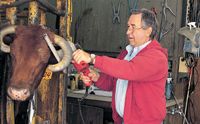Animal welfare attitudes, concerns vary among DVM faculty, study reveals
EAST LANSING, MICH.-Veterinary college faculty are more comfortable with production methods for sheep and cattle than those used in poultry and swine management.
EAST LANSING, MICH.—Veterinary college faculty are more comfortable with production methods for sheep and cattle than those used in poultry and swine management.

Dehorning has been an accepted part of cattle management in the United States for generations. Veterinarians use sedation and local anaesthesia to minimize pain caused by the procedure.
That statistic comes as Michigan State University (MSU) researchers unveil the results of a 2003 study concerning animal welfare attitudes among veterinary college faculty in the United States. According to the study's authors, the report is slated for publication in an upcoming issue of the Journal of the American Veterinary Medical Association.
The results are telling, lead author Camie R. Heleski says. Additional authors include MSU researchers Angela Mertig and Adroaldo Zanella.
"They weren't necessarily surprising, considering the profession's focus on animals," says Heleski, coordinator for MSU's horse management program. "But we definitely found that veterinary medical faculty have different animal welfare ideas depending on the species."
Breakdown
Of the 750 faculty members with a large animal emphasis polled, 31 percent responded to the national survey, Heleski says.
Reaction drawn from the seven-page survey revealed 50 percent of respondents are concerned with cattle dehorning methods, 25 percent to 30 percent are concerned with means for cattle castration and 90 percent are concerned with production-related lameness in cattle, Heleski says.
All over the map
Considering all responses, the following six themes repeatedly were present: economics, perceived lack of consumer support, producer attitudes, lack of understanding of what comprises appropriate animal welfare, politics and tradition, Heleski says.
Just a handful of respondents volunteered to answer the survey's only question requiring a qualitative, open-ended answer. It asked, "If you feel changes related to animal welfare are needed, what do you see as the major obstacle(s) to affecting changes in our current production systems?"
Six respondents relayed that they did not believe welfare science research. Four perceived that the welfare science research has been anthropomorphic, and nine respondents volunteered that one obstacle to furthering farm animal welfare is the issue of undereducated/underpaid employees. An additional nine respondents volunteered the issue of current housing designs being an obstacle to welfare enhancement, Heleski says.
Professional perspective
While veterinarians offer varying views concerning the state of animal welfare as related to current production practices, animal science faculty members reveal a largely conservative perspective.
According to a related study by Heleski, published in August issue of the Journal of Animal Science, most of the 445 animal science faculty members polled throughout the United States feel that the predominant methods used to produce various types of animal products provide appropriate levels of animal welfare.
Findings in the study "Assessing attitudes toward farm animal welfare: a national survey of animal science faculty members" also show that greater than 90 percent of respondents support general principles of animal welfare, such as keeping animals free from unnecessary fear and distress.
However, practices shown to elicit distress, such as castration without anesthetic, were deemed a concern by just 32 percent of respondents, the study says.
As with veterinarians, gender also played a role, Heleski says.
"Women, as a rule, tend to have more liberal views," she says. "With veterinarians and animal science faculty, women show significantly higher concern for animal welfare."